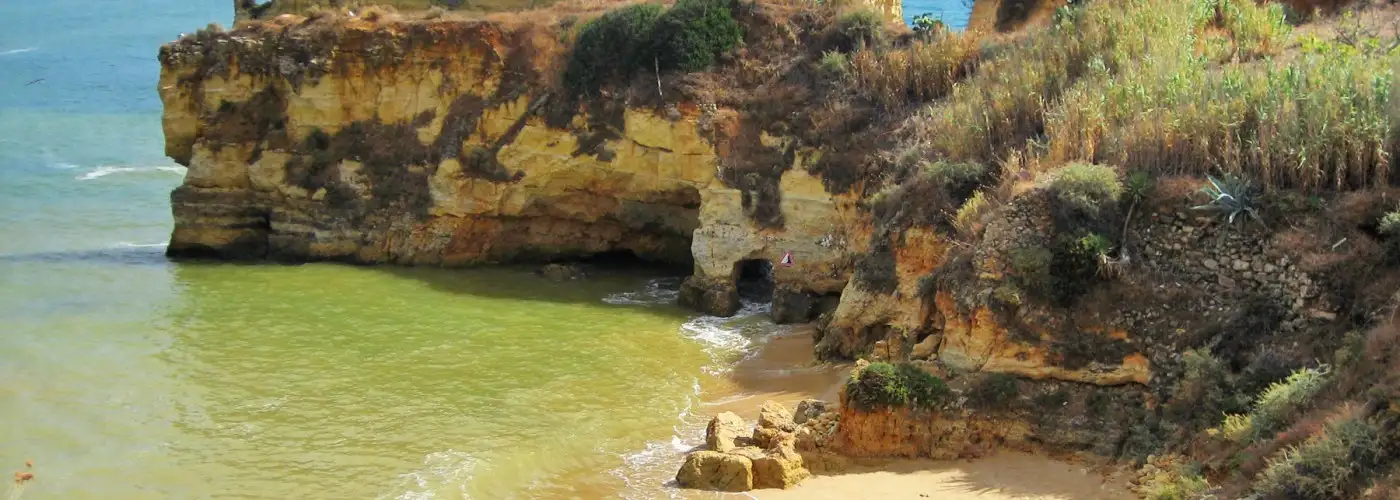For some time, I’ve been wanting to return to the Algarve, in southern Portugal, my favorite stretch of Iberian coastline. Warm and dry, the south coast stretches for some 100 miles, with beach resorts along the water’s edge and, farther inland, rolling green hills dotted with orchards. The coastline varies from lagoon estuaries in the east (the town of Tavira), to sandy beach resorts in the center (from Faro to Lagos), to rugged cliffs in the west (Sagres).
The Algarve was once known as Europe’s last undiscovered tourist frontier. But it’s well discovered now, and if you go to the places featured in most tour brochures, you’ll find it paved, packed, and pretty stressful. Still, there are a few great beach towns left along the coast, perfect for soaking up rays from May through early October.
My research schedule generally brings me to this part of the world in the early spring, though, when the beach towns are pretty dead. But this year I made it there in June, and what a difference—the coast was lively, warm, and relaxing. I made a point of revisiting my favorite hideaway, the little fishing town of Salema.
When I first came to Salema, in the late 1970s, the road into town wasn’t paved. I turned up in the early evening, driving a group of eight in a minivan and with no reservations. I parked at one end of the town’s “street of fishermen” (Rua dos Pescadores), flagged down some locals, and asked, “Quartos?” Within minutes I’d found nine beds in private homes for a few bucks each.
While the street looks pretty much the same today, the character of the town is changing. Nowadays, beach towns like Salema are becoming the playgrounds of an international crowd of retirees and vacationers, who stay in newly built gated communities and golf clubs on the inland hilltops. The ladies who once rented out rooms have disappeared, chastened by stricter government regulations (necessary, as southern Europe learns to pay its taxes). There are fewer shoestring-budget backpackers to keep them in business anyway.
Still, the children of the old fishermen—at least those who haven’t gone to the big city in search of jobs—continue to cook up the fish and staff the weather-beaten fort. And Salema still has everything a vacationer needs: a handful of seafood restaurants, a few hotels, a fine beach, one ATM, and nonstop sun. With no must-see attractions, this sleepy place is all about rigorous rest and relaxation.
Salema continues to support some fishing—but just barely. Most of the business is done in bigger fish markets nearby, in Sagres and Lagos. But at night, you’ll see six or eight boats out on the water, their lights bobbing on the horizon, as local fishermen work to catch squid, sardines, and octopus. In the calm of the summer, boats are left out on buoys. In the winter, a community-subsidized tractor earns its keep by hauling the boats ashore. (In pre-tractor days, such boat hauling was a 10-person chore.)
Salema’s town square hosts a small market on flatbed trucks—one each for fish, fruit, vegetables, and bakery items. The vendors blitz in and out on weekday mornings; expect to be woken at 8:00 a.m. by the tooting horn of the fish truck. Out on the beach, residents and tourists pursue a policy of peaceful coexistence. Two-year-olds toddle in the waves, supine women read German fashion magazines, and old men mend their nets.
On one end of the beach, at low tide, you can usually scramble over the rocks past tiny tide pools to secluded Figueira Beach. (But if the tide comes in, your route back will be over land.) While the days of black-dressed widows chasing unclad Nordic women off Figueria Beach are gone, topless bathing is still risque today. Sun worshippers disrobe with discretion.
If you feel the need to do some touring, a 15-minute drive to the west gets you to the most romantic beach in the region: Praia do Castelejo, complete with a good restaurant (near Cape Sagres). If you head in the other direction, you’ll trip into the beach-party/jet-ski resort of Lagos.
But Salema’s sleepy beauty nearly always kidnaps my momentum. My typical day begins and ends with the sound of waves. In the morning, I amble over to one of the hidden beaches within walking distance of town. I grab a late lunch overlooking the water, spend the afternoon relaxing on the town beach, catch the sunset with a drink in my hand, have a nice beachside dinner of grilled sardines—and then fall asleep to the steady thrum of the surf.
Tomorrow I’ll do it all over again. You should too. Idyllic Salema remains a delightful stop on any Iberian itinerary.
(Photo: Rick Steves)
Rick Steves (www.ricksteves.com) writes European travel guidebooks and hosts travel shows on public television and public radio. Email him at [email protected] and follow his blog on Facebook.
You Might Also Like:
- Oslo, City of Art and Design
- Faial: A Secret Island in the Middle of the Atlantic
- Rick Steves: Italy’s Alluring Amalfi Coast
We hand-pick everything we recommend and select items through testing and reviews. Some products are sent to us free of charge with no incentive to offer a favorable review. We offer our unbiased opinions and do not accept compensation to review products. All items are in stock and prices are accurate at the time of publication. If you buy something through our links, we may earn a commission.
Top Fares From
Today's Top Travel Deals
Brought to you by ShermansTravel
Kenya: 14-Night Tour, Incl. Tanzania &...
smarTours
 vacation
$7125+
vacation
$7125+
7-Night Caribbean Round-Trip Cruise From Orlando:...
Norwegian Cruise Line
 cruise
$739+
cruise
$739+
Ohio: Daily Car Rentals from Cincinnati
85OFF.com
 Car Rental
$19+
Car Rental
$19+




